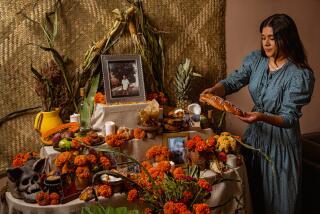Room for Ethnic Roots in the Church, Pope Says
- Share via
MEXICO CITY — In an appeal to indigenous Mexicans who have been leaving his church, Pope John Paul II donned an embroidered Indian stole and honored two controversial martyrs Thursday, calling them examples of how “one can reach God without renouncing one’s own culture.”
Then he bade goodbye to this predominantly Roman Catholic nation, waving at an estimated 1 million admirers who cheered, played mariachi music and tossed flowers at his popemobile on the way to Mexico City’s airport. As his plane took off for Rome, they held up mirrors to send him flashes of reflected sunlight as a farewell gift.
The pope capped an 11-day journey to the Americas with two days of Masses here that evoked Mexico’s pre-Hispanic civilizations in an unusual departure from traditional Catholic ceremony. On Wednesday, he proclaimed Juan Diego Cuauhtlatoatzin the first indigenous American saint.
On Thursday, the pope beatified two lesser-known Indians, Juan Bautista and Jacinto de los Angeles, placing them a step from sainthood. The honor stirred criticism from some Indian leaders because the pair had been informers for the Spanish Inquisition, helping stamp out indigenous forms of worship in a sometimes violent process of Catholic conversion.
Acting on a tip from the two men, colonial police came to their Zapotec village of San Francisco Cajonos in 1700 and raided a pagan ceremony. Villagers retaliated by hacking the informers to death with machetes, after the pair refused to renounce Catholicism.
Colonial authorities, in turn, meted out the same punishment to the attackers, decapitating 15 men and staking their body parts along a roadside as a warning.
“These two martyrs gave their lives for their faith, but at the expense of their community,” said Fausto Guadarrama, a Catholic who is president of Mexico’s Assn. of Writers in Indigenous Languages. “It’s an unpleasant story. It won’t gain wide legitimacy among our peoples.”
John Paul is trying to stem an exodus of indigenous Mexican Catholics to Protestant religions, whose missionaries have translated the Bible into Indian languages and are regarded by converts as more sensitive to native cultures.
The pope denied Thursday that the two martyrs had betrayed their roots. They were, he said, “enlightened by Christ” to adapt their native cultures to Catholicism without renouncing them. He defended their informant work as “blameless.”
Their example, John Paul said, “encourages indigenous people today to appreciate their cultures and languages and, above all, their dignity as children of God.” He added, “This dignity must be respected by others.”
Some worshipers at Thursday’s beatification Mass said they weren’t bothered by the reminder of the church’s brutal intolerance, because John Paul years ago had apologized for abuses of the Inquisition.
“What happened three centuries ago is different from what could happen today,” said Rolando Celaya, 27, who followed the nationally televised Mass on a giant screen outside the Basilica of Guadalupe. “It was a mistake to punish those who believed in other things, but, thank God, that has changed.”
The Mass was replete with rituals reminiscent of the pagan ceremonies that the two martyrs had denounced.
An Indian woman brushed herbs over the pope and other clerics, a practice originally meant to cleanse people of illness and harmful spirits. Zapotec Indians in feathered headdresses the size of satellite dishes whirled to the lively beat of a brass band from the martyrs’ native village in Oaxaca state.
Celebrants read prayers in seven Indian languages, and John Paul greeted worshipers in Zapotec. The slightly acrid incense wafting through the basilica came from indigenous villages that produce it from copal, a tropical tree resin.
This was John Paul’s fifth visit to Mexico, scene of his first papal trip 23 years ago and a country that embraces him as an adoptive father. The pope, 82, trembles from Parkinson’s disease, and, while his voice was unusually clear Thursday, many faithful said this might turn out to be his adios to Mexico.
“I go, but I do not leave,” John Paul said wistfully at Mass, quoting a popular Mexican song. “Although I’m going, my heart remains.”
“Don’t go! Don’t go!” the crowd in the basilica chanted back.
The pope’s spellbinding effect on Mexicans, enhanced by his physical suffering, may have obscured his central message--that the country must stop discriminating against its impoverished Indian minority.
Mexican commentators paid less attention to that message than to the fact that President Vicente Fox greeted John Paul late Tuesday by bowing and kissing the papal ring.
Polls published Thursday on the front pages of two Mexican newspapers showed that nearly two-thirds of Mexicans approved of the reverential gesture. Mexico has a 150-year tradition of strict church-state separation, but Fox has not shied from displaying his Catholic faith.
As the papal plane taxied away Thursday, Fox told a national television audience that John Paul’s visit “leaves us with a renewed commitment to indigenous peoples ... to integrate them fully into Mexico.”
From off camera, a reporter shouted, “Mr. President, is Mexico still a secular state?”
Fox did not reply.
More to Read
Sign up for Essential California
The most important California stories and recommendations in your inbox every morning.
You may occasionally receive promotional content from the Los Angeles Times.










